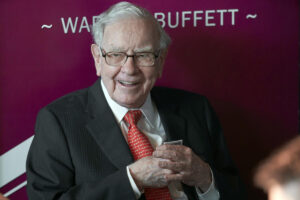Warren Buffett on the Future of U.S. Stocks: A Long-Term Perspective
Warren Buffett, the legendary CEO of Berkshire Hathaway, has reaffirmed his long-standing commitment to investing in U.S. equities. In his latest letter to shareholders, he emphasized that despite Berkshire’s substantial cash reserves, the company’s focus remains firmly on the stock market, a signal that might just be music to the ears of investors navigating an increasingly complex economy.
Buffett’s Unwavering Confidence in Equities
Buffett shared, “Despite what some commentators currently view as an extraordinary cash position at Berkshire, the great majority of your money remains in equities. That preference won’t change.” This statement comes against the backdrop of extensive media coverage regarding Berkshire Hathaway’s cash position, which has surged to an impressive $334 billion, up from $167.6 billion over the last year. While some may interpret this growth as a prudent safeguard, Buffett suggests it’s merely part of a larger strategic picture.
He acknowledged that the value of Berkshire’s marketable equities did decrease last year—from $354 billion to $272 billion—but paints a broader picture with a focus on the value of its non-quoted holdings. Berkshire owns 189 companies, including household names like GEICO, Precision Castparts, and BNSF. The current downturn in marketable assets contrasted with a notable increase in the overall value of Berkshire’s non-quoted controlled equities underlines Buffett’s belief in the strength and adaptability of American businesses.
The Resilience of American Business
During economic turbulence, firms may wobble, but they have an enduring capability for adaptation, a sentiment Buffett is quick to echo. “Businesses, as well as individuals with desired talents, however, will usually find a way to cope with monetary instability as long as their goods or services are desired by the country’s citizenry,” he noted. This assertion reinforces his position that long-term, well-managed businesses will thrive irrespective of cyclical challenges.
Buffett has always contended that stocks are a superior investment compared to cash or bonds, stating, “Berkshire will never prefer ownership of cash-equivalent assets over the ownership of good businesses.” In light of recent monetary policy shifts and inflation concerns, this philosophy resonates even more strongly today.
Key Macroeconomic Updates
The broader economic landscape is influenced by various macroeconomic factors, and there have been several developments worth noting:
- Home Sales & Prices: Home sales of previously owned homes saw a decline of 4.9% in January, indicating a cooling in the housing market as elevated home prices and stable mortgage rates present affordability challenges.
- Employment Figures: Initial claims for unemployment rose slightly to 219,000, yet remain indicative of ongoing economic growth, contrasting against concerns over potential economic slowdowns.
- Consumer Sentiment: Contradictory signals are occurring as consumer sentiment has tumbled, yet CEO confidence appears to be on the rise, with many leaders optimistic about future economic conditions.
The Long Game in Investing
As investors, it’s crucial to keep a long-term perspective. Short-term volatility is inevitable, but the underlying fundamentals of the economy paint a more promising picture. According to the latest data, expectations for U.S. GDP growth remain positive, suggesting resilience in consumer spending despite occasional market jitters.
Companies have utilized the recent pandemic shifts to optimize their operational structures, resulting in improved efficiency and earnings growth—a clear illustration of the positive operating leverage at play.
Risks and Resilience
While the horizon looks largely favorable, risks persist, from geopolitical tensions to fluctuating energy prices. Notably, the current political landscape remains uncertain, which could pose challenges to investor confidence and contribute to market volatility. However, historical data shows that resilient strategies and a focus on long-term growth tend to outlast such disruptions.
In conclusion, Buffett’s overarching belief in American capitalism remains steadfast, rooted in the historical ability of U.S. businesses to adapt and thrive under pressure. As we move forward, it’s clear that while the road may be bumpy, with the right approach, the long game continues to be a victor’s game—one that savvy investors should embrace wholeheartedly.
At Extreme Investor Network, we believe that informed investors are successful investors. By staying updated on market trends, understanding the implications of macroeconomic changes, and making strategic decisions based on long-term value, you too can navigate the complexities of the market with confidence. Stay tuned for more insights and actionable advice as we chart a course together through these turbulent but promising waters.

